Le Million, 1931, directed by René Clair, written by René Clair, from the play by Georges Berr and Marcel Guillemaud.
Comedy doesn't travel well. When a movie is going to be translated and dubbed or subtitled, post-production gives translators a giant binder with an annotated version of the closed captioning, explaining every idiom, allusion, and pun. The goal is to give the translators enough information to try to make the jokes funny in whatever language they'll be appearing in. Results can be mixed. One of my oddest memories of Italy was watching a dubbed version of "The Simpsons." Faced with the difficult task of translating the show's intensely allusive verbal humor to Italian, the producers pretty much punted. I had to explain why Sideshow Bob would write a letter to "Vita In Questi Stati Uniti," and why that was cracking me up. By the time I'd jumped through all the cultural and linguistic hoops, the joke wasn't funny anymore. The big sellers in international markets are genres that aren't at the mercy of language.
It wasn't always this way, because film didn't used to depend on language much at all, except for the universal language of Wurlitzer music. The last comedy stars that truly transcended language and culture were in silent movies: Keaton, Lloyd, and Chaplin. Le Million is a sound film, but it's an early sound film, made by a director who didn't trust sound very much. As a result, the jokes are very physical and non-verbal. And universally funny. After the high-culture earnestness of The Magic Flute, it was a relief to watch Le Million and return to the kind of opera I grew up with:
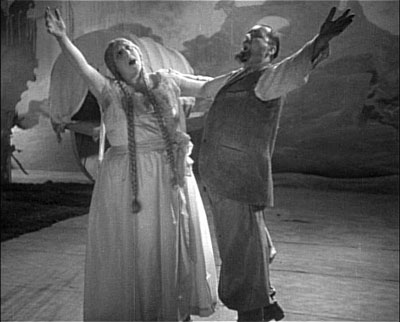
The kind of opera where a fat lady with braids belts it out while comic hijinks happen backstage. Yep, Le Million is that kind of movie, less interested in bringing culture to the masses than bringing the masses to the movie theater. The hero is a down-on-his-luck artist named Michel Bouflette. As played by René Lefèvre, he's perfectly dazed by just about everything around him:
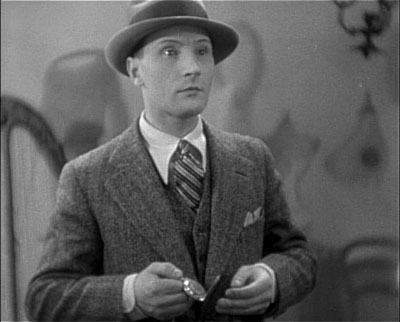
And when he's not dazed, he's getting into trouble. Michel is a bit of a scoundrel; this is mitigated by the fact that he's also a bumbler. As the film opens, he's attempting to seduce Vanda, a beautiful woman whose portrait he is painting.
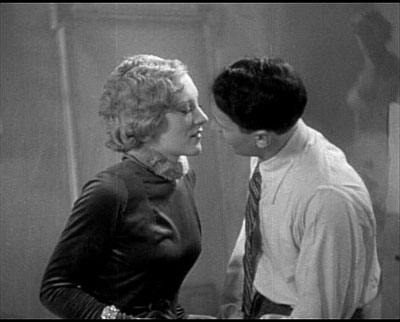
Unfortunately for Michel, just as they're about to kiss, a young woman enters the apartment without knocking, sees Michel and Vanda, and leaves, clearly embarrassed. "You're probably wooing her," says Vanda. "No no no no no, not at all," Michel reassures her. "We're just sort of engaged." You see this scene in a lot of romantic comedies, but it's usually the inciting incident for the spurned fiancé's personal voyage (e.g., Along Came Polly). Only the French would have the cheater be the hero. It helps that Béatrice, Michel's fiancé (played by one-name-wonder Annabella) is a bit of a flirt herself:
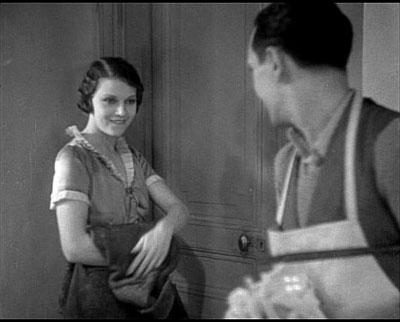
I'm pleased to report that the whole film is as light and flirtatious as that still. That's particularly impressive because Le Million is at least partially about class warfare. Like any self-respecting young painter, Michel is pursued by an army of creditors:
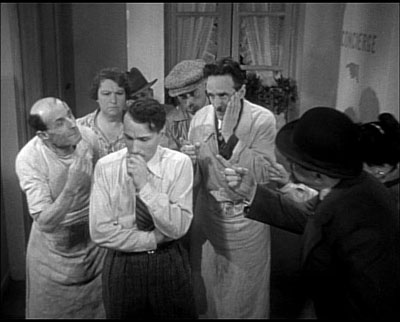
But his local shopkeepers' contempt changes instantly to rapt admiration when they realize he's just won one million florins in the lottery. They quite literally sing his praises, falling over each other to please him:
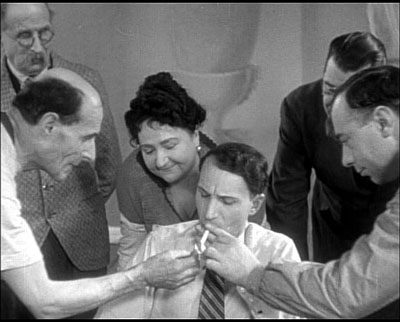
Of course, Michel himself is affected by his sudden wealth. He's established early on as a dreamer, and a sudden influx of money doesn't really help him stay grounded.
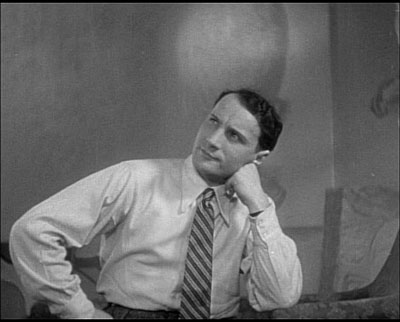
Michel is the sort of person who comedies always make suffer a bit on the way to their happy ending. So it's not a big surprise when he realizes that Béatrice has loaned the coat that held the winning lottery ticket to a drifter. This is a standard screwball comedy plot, not exceptional in itself. What makes the movie is René Lefèvre's unsurpassed ability to suffer hilariously. One example: shortly after realizing he is not, in fact, a millionaire, Michel races to his apartment to grab a coat before leaving to track down his lottery ticket. It's one of those movie moments where TIME IS OF THE ESSENCE and EVERY SECOND COUNTS. Unfortunately, Michel's neighbors have prepared a little ceremony to commemorate his admirable achievement of winning a lot of money. A little girl recites a speech and presents him with a bouquet, and then everyone insists he pose for a photograph. He's not really into it, and the photographer's typically thorough instructions ("Smile a bit more. To the right. Hold it right there.") are excruciating. Here's the final photo:
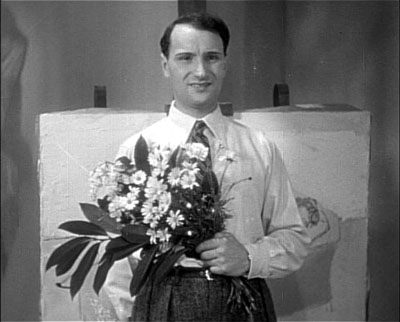
He's sort of the anti-Falconetti. Most of the jokes in Le Million would have been equally easy to stage in a silent film; Clair depends on visual gags. There's the old fat-man-thin-man duo at the opera:
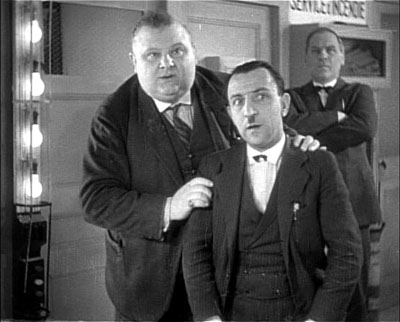
There's a highbrow master thief with a penchant for obviously false mustaches:
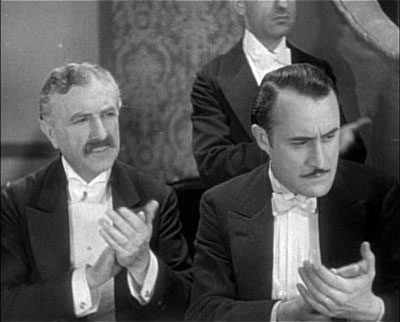
And of course, there's the tried and true "guy in a prison cell wearing only boxers and a bowler for no doubt hilarious reasons which are never explained" gag:
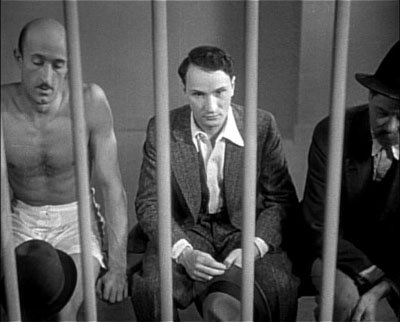
These characters and setups are straight out of silent films, and they don't depend on culture or language. The jokes people remember the film for, however, could never happen in a silent film. But they're still not dependent on language. Instead, they're innovative uses of the soundtrack that would seem fresh if used today.
The first is the one everyone writes about: the rugby or football match at the end. By the time all the major characters arrive at the opera, Clair has set up at least four distinct groups of people who want the lottery ticket. As you would expect, they have a battle royale backstage. However you staged this, there's a lot of potential for physical comedy. So even played silently, this sequence is pretty funny. But instead of relying on the visual gag alone, the filmmakers chose to have the diagetic sound fade out as soon as someone grabbed the coat, and faded up the sound of a crowd at a rugby match, complete with whistles and cheers. So as Michel and the others try to race past one another, blocking and tackling like pros, you hear yells and roars from the crowd and frantic whistles from referees as people go down. It adds to the feeling of general mayhem in a way that's impossible to describe until you see it. I've watched this scene at least ten times now, and it still cracks me up.
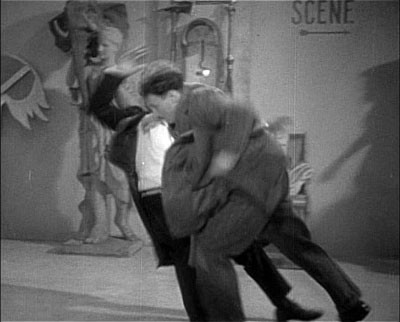
That said, the backstage madness isn't my favorite sequence in the movie. Le Million is a romantic comedy of sorts, and that means it has to have everyone's least favorite scene in any romantic comedy. You know the scene I'm talking about: where the guy tells the girl what a fool he's been and what a lesson he's learned and how much he loves her and if she'll just give him another chance... I hate this particular scene; it's never handled gracefully. And like any romantic comedy, Le Million has a version of it:
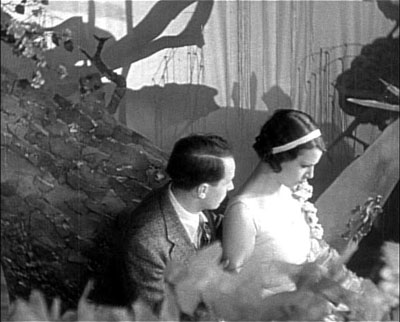
Only in Le Million this scene happens while Michel and Béatrice are hiding from the audience behind the onstage scenery at the opera. Which means they can't talk. Which means we don't have to listen to any insipid or out-of-character dialogue. Instead, we get to hear the two other people on stage, singing at the tops of their lungs about love:
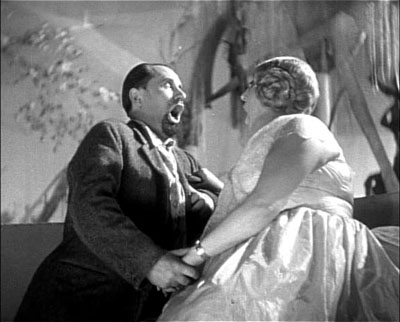
Under that torrent of sound, Michel and Béatrice play their scene basically as a pantomime, showing the kind of physicality that more or less disappeared with the coming of sound:
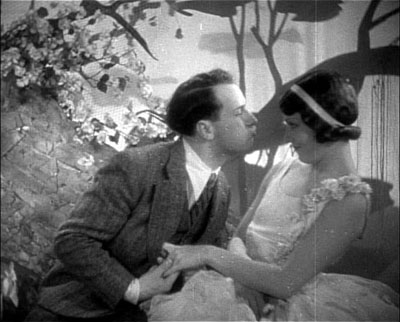
It's absolutely perfect: light, flirtatious, and hilarious. René Clair makes me wish other filmmakers would manage this story beat as well. It wouldn't have to be as brilliant as Le Million; I'd settle for palatable. Anything to avoid hearing Owen Wilson give another heartfelt speech about love.
I said the film was partially about class warfare, but that probably isn't apparent from what I've described so far. But the more you pay attention to Le Million, the more you notice that its obsession with money has more of an edge than, say, Brewster's Millions. For one thing, pay attention to Michel's neighbor and friend, the interestingly named Prosper. When we first meet him, he's dressed as a servant, and basically friendly. He next appears in middle-class attire, by which I mean that he looks like a golfer:
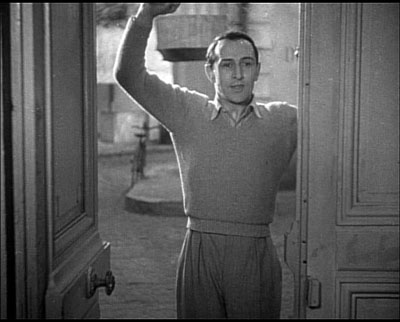
In this outfit, he refuses to split his potential lottery winnings with Michel. By the end of the film, he's wearing a tuxedo and tails and getting into fistfights over money. The more upper-class his wardrobe, the more of a bastard he is. Then there's the character of Grandpa Tulip, (pictured above with a fake mustache), who leads an energetic group of pickpockets and thieves. The first time we see him presiding over a meeting of his confederates, he leads them in a song, energetically conducting, and stopping until they hit a high note correctly. That's silly and amusing enough that you might not notice what they're singing:
We are the foot soldiers of inequality!
We take back the spoils of social injustice!
And under the watchful eye of the police,
We redistribute wealth and private property!
It's closer to Brecht than Gilbert & Sullivan. Of course, lots of thieves cast themselves as Robin Hood, and lots of romantic comedies involve a frantic search for a large amount of money. But in your typical comedy about money, the lesson the hero has to learn is, basically, "Don't worry so much about money." And that lesson does get a hearing in the film's final song. All the characters sing, "Money isn't everything, so beware!" Fair enough. But the song continues:
So say folks who are intelligent
To folks who haven't got a cent.
We'll believe what they say,
When they give all their money away.
Priceless.
Randoms:
- The DVD features a kinescope of Jim MacAndrew interviewing René Clair from 1959. He's very interesting when talking about the way sound changed the landscape of filmmaking, despite looking a bit like Peter Lorre at his most disreputable:
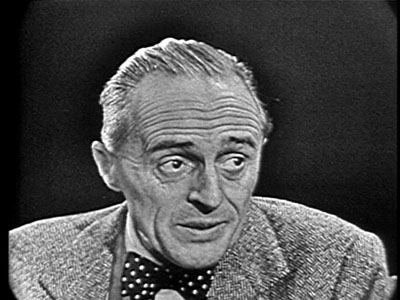
- Here's his basic point about the effect talkies had on comedy technique, French syntax intact:
- One other strange thing about Clair's television interview. It was broadcast live, but it features a clip from Le Million. It appears that the clip was being broadcast from a projector, because when MacAndrews calls for it to start, you hear the sound of a magnetic tape soundtrack coming up to pitch from a stopped position. It sounds like they just had a TV camera in a theater with a projector threaded to the right position and a mike next to a speaker. The squeal of the tape getting up to speed sparked some nostalgia, however; it's something that was quite familiar in the days of Walkmen, but I hadn't heard it in years, except when Mrs. Krabappel shows her class an educational film on "The Simpsons." Like the sound of a record needle hitting a scratch and bouncing off the record (which has come to mean "Someone has just said something shocking, but amusing!"), this is a sound effect that will eventually be completely detached from its signifier, until it just means "this sequence is meant to be appreciated as camp, like a classroom film of the 1950s."
- Le Million opens with a great effects shot, a lengthy track across the rooftops of Paris. Clair opens with a shot of two lovers bidding each other goodnight from their windows:
Having the facility of words and dialogue, people were not obliged anymore to look for new forms of expression which were purely visual. Since the talkies, most of the best comedians came from the radio, which is a proof of what I say, you know. It means now they come because they can be brilliant in dialogue. You see, they might eventually be good at the action, you know, but you take them from the radio because they are famous on the radio, and as good dialogue— as good speakers, you see? Well, when a writer has to prepare a script for these people, he has not to worry about inventing visual things—you know that the comedian will be funny with words and dialogue. But for words and dialogue we have the stage, we have the radio, we don't need the motion picture.Clair's concern no longer really applies, since the stage and the radio died as popular outlets for comedy soon afterwards. Unless you count wacky morning DJs.
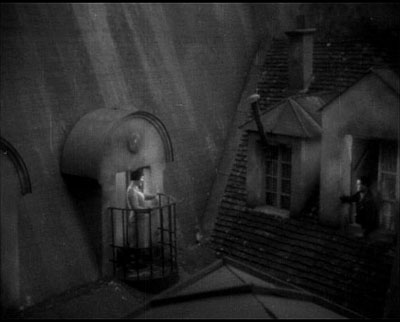
- He then tracks right, where the life-size set is replaced by model buildings, very close to the camera:
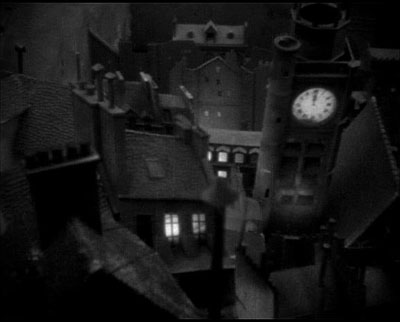
- And then closes with another life-sized roof, far to the right.
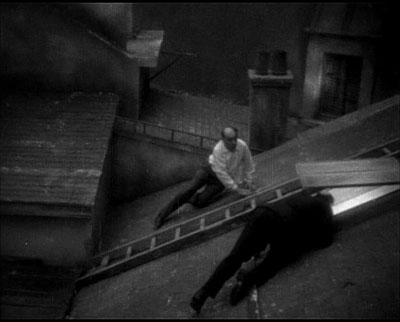
- The effect is that of a helicopter shot, years before such a thing would be practical. And although the model work isn't perfect, this is done in a single shot; there aren't any Orson Welles-style hidden mattes. Here's a picture of the set. To the right, you can see the camera rails; in the foreground are the models, and in the distance, you can see one of the life-sized sets.
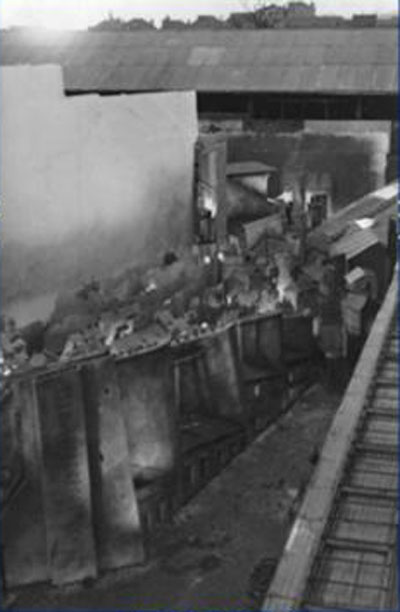
- Forced perspective is something you rarely see these days (although Peter Jackson used it extensively in The Lord of the Rings), and I think that's a shame. Done correctly, it's completely seamless, and it's a lot cheaper than CGI, helicopters, or CGI helicopters.
Another extremely well written piece. It made me want to get home to watch my copy of the film again!
ReplyDeleteGlad you enjoyed it. And thank you for the links on the Criterion Forum page!
ReplyDeleteHi, just want to say I really enjoy your reviews. Just wondering, what do you use to/how do you take the DVD screenshots? Thanks!
ReplyDeleteAlissa,
ReplyDeleteGlad you're enjoying it. I use Intervideo WinDVD 6.
I really wish I loved this film more, especially after reading your thoughts... but I couldn't. I just couldn't. I love musicals, I love the French, I love films from the 1930s, but I don't love Le Million.
ReplyDeleteJustine,
ReplyDeleteUnderstandable. It's not on my list of movies to take to a desert island, but it's got it's moments. Was there something in particular you didn't love?
Matt
I just happened to stumble upon your blog while searching for the song that appears in the end : 'Money isn't everything, so beware'.
ReplyDeleteI didn't just find what I was looking for here, but I had a great time reading the lovely article that you so passionately wrote. The in-depth analysis is really great though by keeping it simple you've managed to keep it interesting, albeit a bit long. But only those who are really into film would read it from the first word to the last if it seems worthy.
I own a quite big collection of films myself, courtesy of my father as well, and many of them are criterion collections. I find your 'Criterion Contraption' pretty interesting and what's more amazing is that you actually know what you're talking about. So thanks a lot for that.